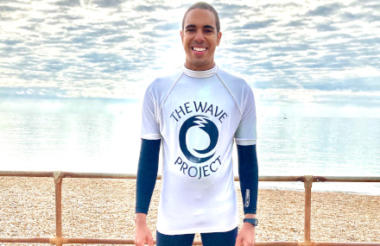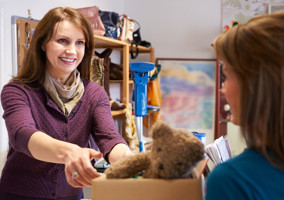The arrival of autumn has felt like a good time to do some personal and professional reflection. So much has changed in the year which gave us a global pandemic that it can be hard to reconcile original intentions with the current reality. At the start of 2020, amid all of my usual well-intended New Year’s resolutions to learn a new language and improve my culinary skills, I set myself a resolution which I was actually able to keep; to start volunteering with the Wave Project in Brighton.
The Wave Project is a small UK-wide charity which uses surfing to help young people improve their emotional and physical wellbeing. I came across the charity by chance in August 2019, when I saw an advert for volunteers in the window of the Brighton office of the Terrence Higgins Trust (a charity I worked at several years ago). As someone who grew up by the sea and has a keen enthusiasm for water-related activities, the Wave Project seemed like a fun and exciting way to volunteer in my spare time whilst also complementing my job at Barnardo’s as a regional media and communications manager.
Working at Barnardo’s, the UK’s largest children’s charity, is something I never could have imagined happening just a few years ago. For someone who had largely worked for small or medium-sized organisations throughout most of his career, it came as a wonderful surprise. On a wider point, until I made a leap of faith and joined Haven House Children’s Hospice in September 2015, I had never even considered the children’s sector. Transferring to a children’s hospice definitely changed my outlook on many things and taught me few benefices are more inspiring and fun to work with than children and young people.
Getting stuck in
After a delayed start due to the disruption caused by lockdown and the pandemic, the Wave Project was able to restart its surf therapy programme at several of its sites across the UK in late summer. Having had the initial volunteer training all the way back in February 2020, when the world seemed like a very different place, I was finally able to get fully stuck in and start volunteering in mid-September.
As a volunteer surf mentor or ‘buddy’, I get to help a young person have fun and develop their confidence in a unique and exhilarating environment. The charity relies on volunteers to operate its surf therapy sessions. The sessions combine surf skills led by a professional surf coach, along with structured beach games and activities, but if the sessions do not have the required ratio of volunteers, they cannot run, which makes the role of volunteers vital.
A course of surf therapy typically runs for six-weeks for each young person who is referred. As a volunteer you are matched with a young person at the beginning for the full length of their intervention. It’s really important to be able to commit to as many sessions as possible, so you can develop rapport and provide a sense of continuity, as some of the young people, due to their individual emotional circumstances, can find sudden unplanned change unsettling.
The young person I was matched with in my first week was a bright and sparky teenager who also experiences high levels of anxiety and low self-esteem. These often act as an acute barrier in his everyday life, but I quickly realised with plenty of encouragement and the right support, he could overcome some of his anxieties and grow his confidence in and out of the water.
Working with others
In August, the Wave Project started a new partnership with Barnardo’s through its See, Hear, Respond partnership programme, a coalition, made up of local and national charities working together to help vulnerable children and young people who have been impacted by the coronavirus pandemic benefit from interventions such as online counselling, therapy and face-to-face support. Through See, Hear, Respond Barnardo’s has been able to refer 286 young people to the Wave Project for wellbeing catch-up sessions. This is an incredible achievement and has meant Barnardo’s has gained access to a unique and specialist support provision which otherwise would have been difficult to achieve.
The Wave Project also provides the opportunity for young people, who have completed their surf therapy course, to be able to join a regular surf club. This allows them to continue their participation and also make new friends. Some of these young people even go on to become young ambassadors or future volunteers, demonstrating the strong circular approach the Wave Project takes towards youth participation.
Life-affirming experience
My experience of volunteering with the Wave Project is without doubt one of the most challenging yet enjoyable activities I have done this year. The sense of responsibility and level of concentration you experience the moment you enter the sea with a young person is immense, but it is also life-affirming, and when you see them develop and grow in confidence in each session, it makes you feel proud to volunteer.
The feedback I have received from the parents of the young person I have supported has been heart-warming. I really hope he continues with his surfing into the long term. I am also looking forward to volunteering with the Wave Project in London.
Ultimately, during this prolonged period of social isolation which many of us are still navigating, I have found volunteering can help with my own emotional health and wellbeing. As a charity communications professional, the excellent people skills and personal experience which we develop from working with benefices can be of real benefit to service delivery, whether it’s for our own charities or partner organisations. If we are able to do this occasionally in our spare time, it can also be a cathartic way to learn and develop outside of the pressures of our day-to-day roles. So rather than waiting another year to consider volunteering as a New Year’s resolution, why not make time for it now; you might even enjoy catching a few waves too!
Scott Roberts is a media and communications manager at Barnardo’s for the charity’s London Region and is training to become a Barnardo’s project worker
Related articles












